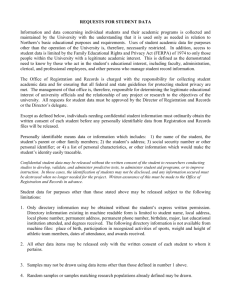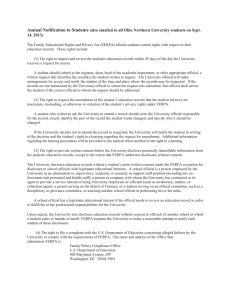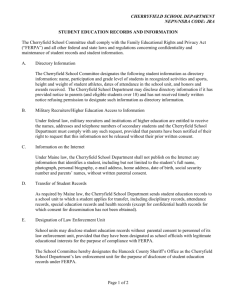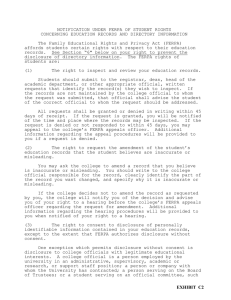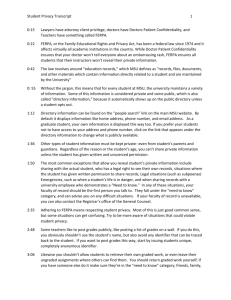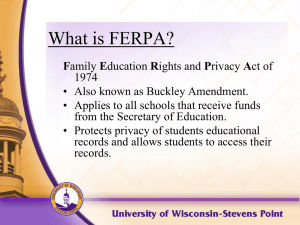Notification of Rights under FERPA for Postsecondary Institutions
advertisement
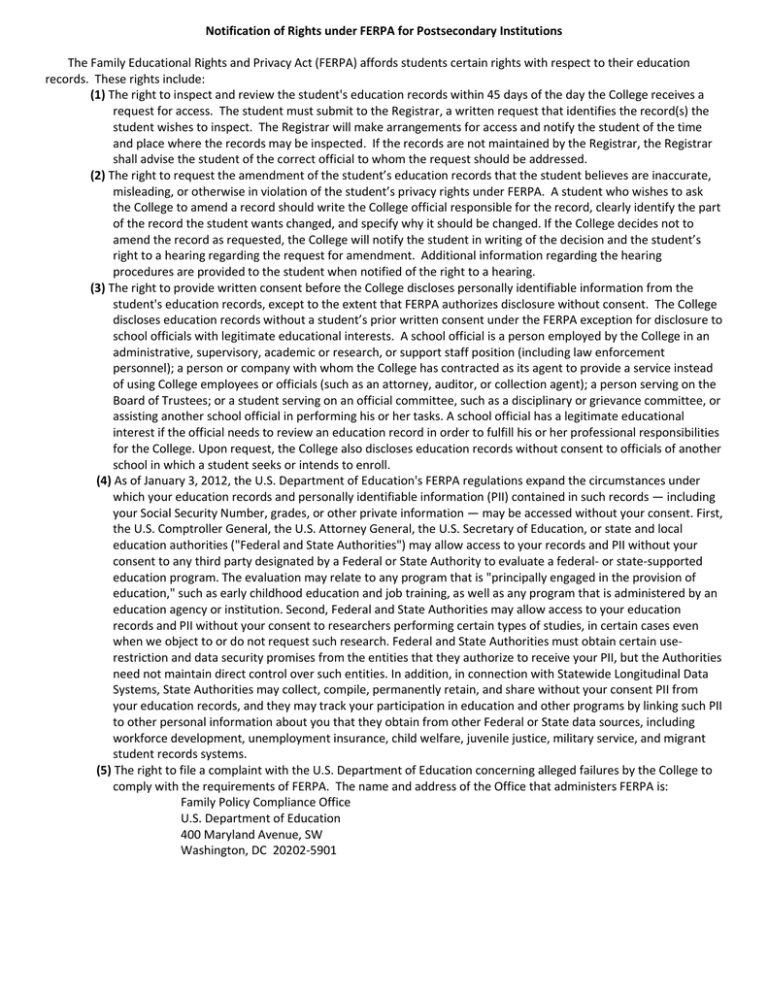
Notification of Rights under FERPA for Postsecondary Institutions The Family Educational Rights and Privacy Act (FERPA) affords students certain rights with respect to their education records. These rights include: (1) The right to inspect and review the student's education records within 45 days of the day the College receives a request for access. The student must submit to the Registrar, a written request that identifies the record(s) the student wishes to inspect. The Registrar will make arrangements for access and notify the student of the time and place where the records may be inspected. If the records are not maintained by the Registrar, the Registrar shall advise the student of the correct official to whom the request should be addressed. (2) The right to request the amendment of the student’s education records that the student believes are inaccurate, misleading, or otherwise in violation of the student’s privacy rights under FERPA. A student who wishes to ask the College to amend a record should write the College official responsible for the record, clearly identify the part of the record the student wants changed, and specify why it should be changed. If the College decides not to amend the record as requested, the College will notify the student in writing of the decision and the student’s right to a hearing regarding the request for amendment. Additional information regarding the hearing procedures are provided to the student when notified of the right to a hearing. (3) The right to provide written consent before the College discloses personally identifiable information from the student's education records, except to the extent that FERPA authorizes disclosure without consent. The College discloses education records without a student’s prior written consent under the FERPA exception for disclosure to school officials with legitimate educational interests. A school official is a person employed by the College in an administrative, supervisory, academic or research, or support staff position (including law enforcement personnel); a person or company with whom the College has contracted as its agent to provide a service instead of using College employees or officials (such as an attorney, auditor, or collection agent); a person serving on the Board of Trustees; or a student serving on an official committee, such as a disciplinary or grievance committee, or assisting another school official in performing his or her tasks. A school official has a legitimate educational interest if the official needs to review an education record in order to fulfill his or her professional responsibilities for the College. Upon request, the College also discloses education records without consent to officials of another school in which a student seeks or intends to enroll. (4) As of January 3, 2012, the U.S. Department of Education's FERPA regulations expand the circumstances under which your education records and personally identifiable information (PII) contained in such records — including your Social Security Number, grades, or other private information — may be accessed without your consent. First, the U.S. Comptroller General, the U.S. Attorney General, the U.S. Secretary of Education, or state and local education authorities ("Federal and State Authorities") may allow access to your records and PII without your consent to any third party designated by a Federal or State Authority to evaluate a federal- or state-supported education program. The evaluation may relate to any program that is "principally engaged in the provision of education," such as early childhood education and job training, as well as any program that is administered by an education agency or institution. Second, Federal and State Authorities may allow access to your education records and PII without your consent to researchers performing certain types of studies, in certain cases even when we object to or do not request such research. Federal and State Authorities must obtain certain userestriction and data security promises from the entities that they authorize to receive your PII, but the Authorities need not maintain direct control over such entities. In addition, in connection with Statewide Longitudinal Data Systems, State Authorities may collect, compile, permanently retain, and share without your consent PII from your education records, and they may track your participation in education and other programs by linking such PII to other personal information about you that they obtain from other Federal or State data sources, including workforce development, unemployment insurance, child welfare, juvenile justice, military service, and migrant student records systems. (5) The right to file a complaint with the U.S. Department of Education concerning alleged failures by the College to comply with the requirements of FERPA. The name and address of the Office that administers FERPA is: Family Policy Compliance Office U.S. Department of Education 400 Maryland Avenue, SW Washington, DC 20202-5901 Notification of Release of Directory Information At its discretion, WV Northern Community College may provide “directory information” in accordance with the provisions of the Family Education Rights and Privacy Act of 1974 (FERPA). Directory information is defined as that information which would not generally be considered harmful or an invasion of privacy if disclosed. Students may block the public disclosure of directory information by notifying the Registrar’s Office in writing. WVNCC designates the following categories of student information as public or “Directory Information.” This information may be disclosed by WVNCC for any purpose, at its discretion: Name of Student; Designation of Limited Use Directory Information WVNCC designates the following categories of student information as “Limited Use Directory Information.” Age of Student; Awards; Campus; City and State of residence; Class Status (i.e., freshman); Dates of Attendance; Degree(s) and Date(s) Conferred, including anticipated graduation dates; Enrollment Status (i.e., full time or part time); Honors; Major Field of Study; Official Address; Participation in Officially Recognized Activities and Sports; Photographs, videos or other media containing a student’s image or likeness (collectively “Student Images”); Place of Birth; Telephone Number; and WVNCC issued student electronic mail addresses (“Email Addresses”). Accordingly, this information will not be provided to external parties not contractually affiliated with WVNCC. Use and disclosure of this information shall be limited to (1) publication on websites hosted by, on behalf of, or for the benefit WVNCC; (2) those officials within WVNCC who have access, consistent with the Family Educational Rights and Privacy Act, to such information and only in conjunction with an official institutional purpose. Please consider very carefully the consequences of a decision to withhold directory information. A non-disclosure block requires WV Northern Community College not to release any or all of this “directory information”; thus, any future requests for such information from non-institutional persons or organizations are refused. WV Northern Community College honors your requests to withhold directory information but cannot assume responsibility to contact you for subsequent permission to release this information. Regardless of the effect upon you, WV Northern Community College assumes no liability as a result of honoring your instructions that such information be withheld. Although the initial request may be filed at any time, requests for non-disclosure are honored by the College until removed, in writing, by the student.
